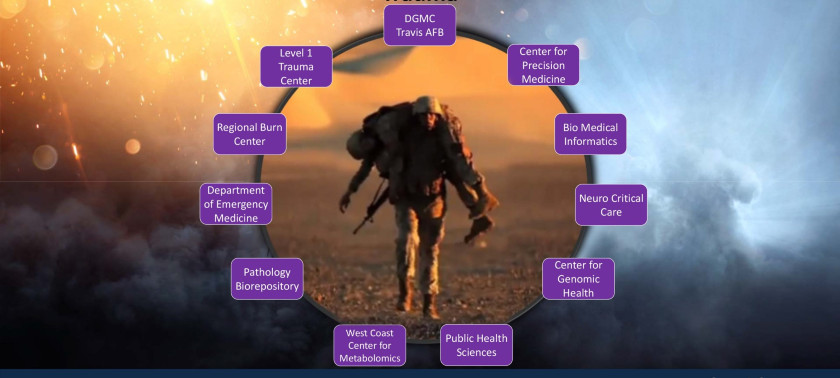Traumatic Brain Injury (TBI) and Burns
Personalized treatment: Traumatic Brain Injury and Burns
Precision medicine for complex care
Military and civilian patients who suffer both traumatic brain injury and burns require complex medical care. Treatment options for concurrent traumas often conflict and health care providers need effective evidence-based guidelines. Our Center brought together a dynamic UC Davis and Department of Defense team consisting of burn surgeons, trauma surgeons, neurosurgeons, geneticists and data scientists to work diligently on improving treatment outcomes by developing a precision medicine approach to care on the battlefield and at the bedside.
Traumatic brain injury (TBI) is a leading cause of death in both military and civilian populations. Each year, approximately 1.5 million Americans sustain a TBI, with around 153 people dying daily from TBI complications. In the military alone, more than 300,000 soldiers died from TBI complications between 2003 and 2019 and many more suffer the consequences of head trauma.
Which treatment strategy should be used when TBI occurs along with a burn injury?
When combined with burn injury, TBI mortality is doubled. Unfortunately, doctors have an inadequate roadmap to navigate treatment in the case of traumatic brain injury coupled with a burn injury. Current TBI treatment focuses on minimizing intravenous (IV) fluid administration to avoid brain swelling. Burn treatment, on the other hand, entails using large amounts of IV fluid to replace those lost by the burn wound. Treatment needs to be precise, individualized and guided by markers of response to treatment.
Improving treatment outcomes with a collaborative team

Dr. Fred Meyers is co-leading the research effort with Dr. Tina Palmieri, professor of surgery and assistant chief of burn surgery at Shriners Hospital for Children of Northern California, and other UC Davis colleagues including burn surgeons, trauma surgeons, neurosurgeons, geneticists and data scientists. Other research collaborators include Major Ian Stewart from the David Grant Medical Center at Travis Air Force Base, and Dr. Mary Jo Pugh, a University of Utah professor and research health scientist with the U.S. Department of Veterans Affairs.

